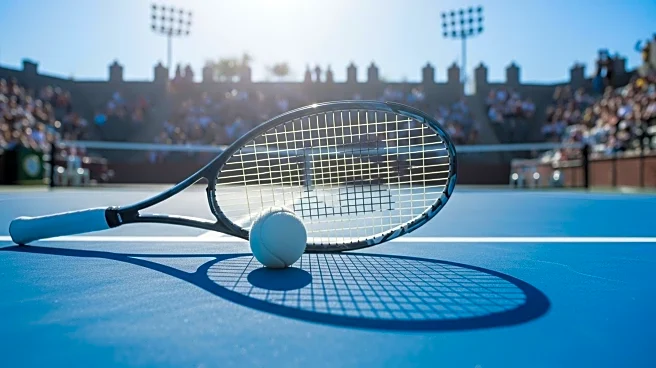What's Happening?
Aryna Sabalenka, the top-seeded tennis player from Belarus, is set to compete against Amanda Anisimova in the women's final of the US Open. Sabalenka, who is 27 years old, is aiming for her fourth Grand Slam title overall and her second consecutive US Open victory. This match marks her third major title contest of 2025, each against an American opponent. Earlier this year, Sabalenka faced defeats against Madison Keys at the Australian Open and Coco Gauff at the French Open. Sabalenka's opponent, Amanda Anisimova, is a 24-year-old American who has a 6-3 head-to-head advantage over Sabalenka. Anisimova, born in New Jersey and raised in Florida, is seeking her first Grand Slam title. She previously defeated Sabalenka at Wimbledon and has made a strong comeback after taking a break from the tour due to burnout.
Why It's Important?
The match between Sabalenka and Anisimova is significant as it highlights the competitive landscape of women's tennis, particularly the emergence of American players challenging top-seeded international competitors. Sabalenka's attempt to secure consecutive US Open titles underscores her dominance in the sport, while Anisimova's journey reflects resilience and the potential for new champions to emerge. The outcome of this match could influence the rankings and future matchups in women's tennis, impacting sponsorships, media coverage, and the popularity of the sport in the US. Additionally, Anisimova's performance could inspire other athletes facing similar challenges, emphasizing the importance of mental health and recovery in professional sports.
What's Next?
Following the US Open final, the tennis community will closely watch the performances of both Sabalenka and Anisimova in upcoming tournaments. Sabalenka's potential victory could solidify her status as a leading figure in women's tennis, while Anisimova's success might propel her into higher rankings and more significant sponsorship opportunities. The match could also influence future Grand Slam seedings and the strategies of other players competing at this level. Fans and analysts will be eager to see how both athletes continue to develop their careers and handle the pressures of high-stakes competition.
Beyond the Headlines
The match between Sabalenka and Anisimova also highlights broader themes in sports, such as the importance of mental health and the impact of burnout on athletes. Anisimova's break from the tour and subsequent comeback illustrate the challenges athletes face in maintaining their performance and well-being. This narrative may encourage sports organizations to prioritize mental health resources and support systems for athletes. Additionally, the match reflects the growing diversity in tennis, with players from various backgrounds competing at the highest levels, potentially influencing the sport's global reach and inclusivity.








